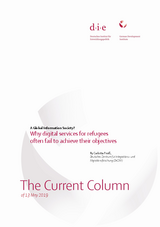A Global Information Society?
Why digital services for refugees often fail to achieve their objectives
Preiß, CarlottaThe Current Column (2019)
Bonn: German Development Institute / Deutsches Institut für Entwicklungspolitik (DIE), (The Current Column of 13 May 2019)
Bonn, 13 May 2019. On 17 May 2019, we will be celebrating the 50th anniversary of World Telecommunication and Information Society Day. What is there to celebrate? Simple, fast and cost-effective communication and procurement of information for large sections of the world’s population. However, it also gives us the opportunity to think about those who are excluded from using Information and Communication Technologies (ICT) or only have limited access to them. There is still a digital divide along geographic and societal lines around the world, and access to ICT services is at least restricted, if not denied, to many in the Global South. This is partly due to the cost of mobile phones and other devices, mobile data and Wi-Fi. It is also because of the lack of mobile network coverage or simply because there is no electricity to recharge batteries. Refugees and digital technologies The problem of access is particularly relevant for refugees. They are often dependent on their mobile phones in many ways: In order to find their way to a safe region and take advantage of education, job, housing and medical services upon arrival. However, for many refugees it is most important that they can stay in touch with friends and family who have been left behind in their home countries. Many international organizations have since become keen on developing ICT services to support refugees. For example, the World Food Program (WFP) has implemented a mobile money transfer system to provide financial support to households in refugee camps in Kenya, while Refunite, a non-governmental organization, has developed an app to bring families back together. These and other digital offerings are undoubtedly well thought out and invaluable to many migrants. But they are not necessarily inclusive. Particularly in sub-Saharan Africa, many refugees still do not have a mobile phone or at least none with Internet access. Over the past few months, a research team from the German Development Institute (Deutsches Institut für Entwicklungspolitik, DIE) has studied the subject of Migration and Digitalisation in Kenya and learned a lot about the high expectations placed on digital solutions by humanitarian actors and the relatively limited Internet access for refugees. In Kakuma, one of the world’s largest refugee camps, nearly all households have access to a mobile phone, but the cost of obtaining mobile data and actually using it is a major hurdle for many families. At the same time, many residents consider it vital to their survival that they can be contacted in the camp by mobile phone - not least so they can benefit from the services offered by the humanitarian organizations. Three recommendations for developers of (digital) services for refugees On the one hand, international organizations should not ignore well-tried analogue strategies to ensure that everyone is reached. Especially in refugee camps or rural areas, investing in offline services such as community events, radio broadcasts or consulting centres can sometimes make more sense than developing expensive, digital apps that can only be used on Internet-capable mobile phones. Furthermore, many people still find radio the cheapest and easiest way to get information. On the other hand, it is advisable to make use of established and familiar communication channels. Especially when it comes to spreading information, it is helpful to use well-known channels like Facebook, WhatsApp or SMS instead of developing new technologies that are not yet tried and trusted. Moreover, when developing an ICT service, it is important to cover all bases and make it accessible on both standard mobile phones and smartphones. At the same time, applications should be designed so as not to consume too much data or use up too much battery, and be intuitive - also for people who cannot read or write. A digital future Notwithstanding these recommendations, it is true that access to ICT continues to expand in the Global South. The development of digital services by humanitarian actors is, therefore, not misguided at all, but can actually make a change in the long run. We can certainly be optimistic on World Telecommunications Day that the digital divide is shrinking and that, in future, modern technologies will be accessible to those that need them most. However, in line with Agenda 2030 and its “leave no one behind” principle, even today, nobody should be excluded from these services - especially not those who find themselves in a particularly vulnerable situation after having fled their home countries.
Carlotta Preiß is a researcher at Deutsches Zentrum für Integrations- und Migrationsforschung (DeZIM) in Berlin. Previously, she was a participant of the 54th Course of the Postgraduate Training Programme at DIE, where she studied digitalisation and information in the lives migrants and refugees in Kenya.

